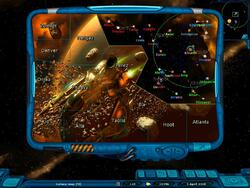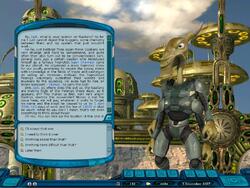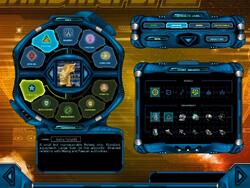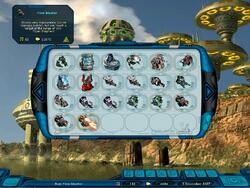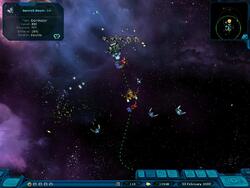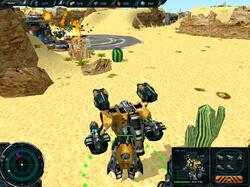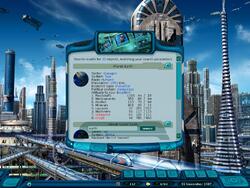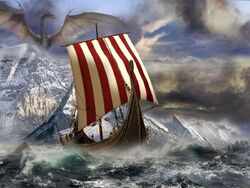Space Rangers 2 Review
Space Rangers 2 Review
Review - posted by Vault Dweller on Tue 14 March 2006, 19:49:54
Tags: Elemental Games; Space Rangers 2: DominatorsThose crazy Russians:
The concept of Space Rangers 2 sounds pretty stupid and impossible: let's combine Elite-like trading and exploration, turn-based space battles, arcade space battles, some pirate stuff, dynamic universe, text adventures, saving the universe from some impeding doom stuff, liberating planets RTS style, some Mechwarrior stuff, and all kind of crazy little things, like getting a plastic surgery at a Pirate Base, when you become too popular and not in a good way.
Well, believe it or not, some Russian outfit, disregarding all the knowledge mankind has learned about making crappy games, has managed not only to put all those elements together, but to make a very good, if not brilliant, game out of all those parts, instantly restoring my faith in humanity and Russian developers in particular.
Once upon a time in a dynamic universe not far away...
The Space Rangers 2's impressive and very beautiful 200+ planet universe is dynamic and alive: pirates attack ships, ships form brief alliances and attack pirates; the Dominators open up black holes and attack planet systems; the Rangers defend systems they still have and attack systems they've lost, sometimes recovering them, sometimes not; space bases are being destroyed and built (you can even finance the building of one). You are thrown in the middle of all that goodness, and what you do is really up to you. You can try your skills in trade, piracy, planet exploration via probes, diplomacy via text quests, and of course, you can help the good guys fight the good fight.
Completing quests will have consequences, improving your relationship with some races, and completely pissing other races off. Also, those damn aliens lie to you and a seemingly innocent mission may turn into an insult to another race. I was once asked to deliver a rare animal specimen to a certain planet as an act of friendship from one race to another. Turns out, you have just delivered an abused ambassador back to his native planet in a cage. Needless to say, a few quests like that will ensure that next time you are in the neighbourhood, you will see battleships speeding toward you to inform in an up close and personal manner that they would really like to see you dead. If you do manage to land on a nearby planet, you will be taken to a local prison, which is a lot more fun than it sounds (see the text adventure "chapter").
Starting up
There are 5 races x 5 classes (Fighter, Mercenary, Merchant, Corsair, Pirate) to choose from when you start the game, and your choice of the race and the class affects the starting ship, equipment, money, and relations with other races. Since it's pointless to waste words listing and explaining races, I will just throw in this handy link that will tell you all you need to know about races.
Anyway, as I was saying, a Human Corsair, for example, starts with "a small, maneuverable ship with good weaponry and brand new radar; a good sized bank account; awful relations with Gaalians and Pelengs", while a Gaalian Corsair starts with "Slow ship with weak defences, equipped with an excellent gripper and droid; small alcohol load in storages; bad relations with all races". You get the idea.
The game generously offers you 6 skills: Accuracy, Maneuverability (defensive skill), Technical (maintaining your vast equipment collection), Trading, Charisma (better rewards and reaction), and Leadership (the number of wingmen you can control. Yes, you can hire pilots and give them orders, without controlling them directly). Blowing up ships, completing quests, liberating systems and individual planets score you experience points, so there is nothing new here.
You also get a choice of a few pieces of starting equipment, and then you are all set to take control of your ship, which brings us to the next "chapter".
Ships & Equipment
Space Rangers 2 certainly doesn't lack in this department. Each race offers you 5 ship classes, so once again, we are talking about 25 ships to choose from. Then we have different hull types with different properties (defense, cargo space, slots configuration, etc), often resulting in an exciting mini-game "Find that perfect hull!", followed by "Find great items!", followed by "Find great upgrades!". Winning all three games would take a very long time, so item-gatherers should be very, very pleased.
You can outfit your ship with weapons (duh!), engine (range & speed), fuel tank (range), scanner, radar, droid (damage repair), gripper (to pick up ore, dropped cargo, or destroyed ships' parts), shield generator (blocks damage and enemy scanners), and various micromodules, affecting or upgrading different things. I've got a handy micromodule that repairs all my equipment slowly, saving me a small fortune on maintenance. As the game goes, new technologies aka better items become available, which mean that you can destroy ships faster and in bigger numbers, fly farther and faster, protect yourself better, etc. Weight & upgrades play an important role here, making older equipment less obsolete and more competitive with newer technologies. I'm using an older, more compact engine with an upgrade that boosts up the range and I can use the extra cargo space for more pillaging. I do have a state of the art gripper though that can drag almost everything in.
Such level of customization allows you to create very different builds like speedy hit-n-run pirates or slow & heavy warships or spacious traders, well-protected against pirate scanners, etc.
Fighting the Dominators
The Dominators are the bad guys (well, bad robots, actually), who, naturally, like to dominate things a lot by invading systems. When that happens nearby rangers answer the call and fly to defend a system in jeopardy or invade systems controlled by the Dominators. What that means for you is that you can always find a system in need of defending or invading, which is conveniently shown on your map.
Space battles are turn-based. There isn't much you can do, but chose the direction and aim your weapons manually, which comes in handy when you want to shoot down some missiles, while maintaining your attacks on the main target, which is not as much fun as it sounds. Some extra commands (anti-missile fire) and some TIE Fighter style depth like switching power from speed to shields would have been very, very nice. The way combat is implemented in SR2, it makes very little difference whether it's turn-based or real time with pause, which is a shame.
Depending on the difficulty level, either the Dominators can take over the universe, leaving less and less personal room for you, or the Rangers can liberate the known universe without your help, so keep that in mind.
When you destroy the Dominators, they leave behind nodes, that you can trade for equipment at the Ranger Bases, and equipment that you can either use or sell to the Research Bases to boost their technology research. Needless to say, you must have a decent gripper to be able to grab heavy items and enough room in your cargo hold. Unfortunately, after the main target is destroyed your remaining missiles tend to target the equipment floating around, so it would be nice to have that fixed.
Liberating Planets
When you have successfully liberated a system and landed on one of the planets, you will be offered an optional (all quests are optional, nothing is forced on you) RTS-style quest. Turns out the Dominators have landed there too and while the purpose of their visit is unclear, they are definitely up to no good, so you must take control of a small base and start building custom made robots and lead them to victory. You can't save in those missions, so mistakes are very costly.
There are 3 kinds of the Dominators with minor differences, and usually there are at least 2 of them on a planet, fighting each other and you, which adds another tactical element. Sometimes helping a weak Dominator to defeat an assault is more beneficial than watching them die, as as long as there is more than one Dominator "type", the stronger enemy won't be able to focus exclusively on you.
You gain resources by taking over and holding different points (factories), similar to the Dawn of War gameplay style. Those factories produce 4 different resource types and increase the number of robots you can build. The maps are small, the robots are expensive, the resources are scarce, so all that creates very intensive, challenging, and interesting gameplay. Every now and then you get reinforcement which is usually 3-4 nicely outfitted (and thus very expensive) robots. Before the scenario starts, you are given options to either increase your robots defense rating or receive reinforcements more often at the expense of experience points and money you get when the mission is over.
You can even take over one of the robots and play the game Mechwarrior-style.
Trading, Mining, Exploring
If the life of a combat pilot isn't for you, Space Rangers universe offers you several lucrative careers. Let's start with trading.
The universe is dynamic, so forget about finding a profitable route and milking it until you can buy entire planet systems and space fleets. The famous supply-n-demand principle will kick in and adjust prices, turning a once sweet and profitable run into a bitter loss. In SR2 you must pay attention to the news announcements, which may inform you that there is a great harvest season on some planet (i.e. cheap food), talk to fellow traders, get tips from government officials, or pay for really great tips at the Business Bases.
A really great feature is the local Net. You can search for anything: specific ships, hulls & equipment, bases, planets, etc. Your search results for planets come up with the current price list for all goods, so you can spend a few bucks for each search and find the most profitable (at the moment) route for your goods.
Some goods like weapons and drugs are not traded freely everywhere, so you will have an option to break some local laws and become a smuggler, which isn't good for your karma, but good for your bank account. Personally, I prefer asteroid mining. There are plenty of asteroids flying around. Target one, blast it, collect ore, sell. Simple and efficient. You won't get very rich, but you will make enough money for reasonable upgrades, repair, reload (missile weapons), etc.
For the explorers, there are a lot of uninhabited planets in every system. Each planet has it's own ratio of mountains / plains / oceans. You can buy probes that could be more suitable for water or mountain exploration, for example. When you land, you can select the flight path that will be the most effective for the probe you are want to use. After the scan is completed, usually several weeks later, you can collect resources and even artifacts.
Text Adventures
Every now and then you will be offered a special quest that must be played in the text adventure mode. You are given several options, you pick one, you are given more options, and so on. These quests are a lot of fun, very well done, and reasonably complex. Here are some examples. At one point, I did a quest that got me in a lot of trouble and led me straight to a local jail. I was given 80 days, and each day I was presented with options. You are given stats that you can develop from average to superior or very poor, you can collect items, and you have reputation reflecting your standing with inmates and guards. The number of things you could do is truly amazing. I ended my first prison visit by escaping through a long tunnel I dug with a spoon I stole in a restaurant. On my second visit I trained hard, and become a boxing legend and a local "don" with more tattos than the Planescape: Torment main character, shaking down the inmates and making more money than I did when I was out. On my other prison trips, I trained a cockroach I found at the library, worked for the warden and his boys, and so on. I was killed a few times too, so don't romanticize the life of a criminal, kids.
Other examples are a bureaucratic planet where you have to register some papers, trying to figure out how to deal with local customs and people who couldn't care less about helping you; a rock concert where you have to build and train your own band in limited time with a limited budget, a bike race where you can build your own bike with different speed, defense, and maneuverability traits, tinkering with some ancient device, and many other. These quests offer a lot of options and different consequences, so it's a very enjoyable element of the game.
In conclusion:
It's a great and unique game that does a lot of things well. Since the game really does a lot of things, I didn't have time to explain black holes, research at the Science Bases, combat software, stimulants, wingmen, ordering strikes at Military Bases, and tons of other fun stuff that I've only heard of. Don't miss this little gem when it hits North America and keep an eye out on Elemental Games.
The concept of Space Rangers 2 sounds pretty stupid and impossible: let's combine Elite-like trading and exploration, turn-based space battles, arcade space battles, some pirate stuff, dynamic universe, text adventures, saving the universe from some impeding doom stuff, liberating planets RTS style, some Mechwarrior stuff, and all kind of crazy little things, like getting a plastic surgery at a Pirate Base, when you become too popular and not in a good way.
Well, believe it or not, some Russian outfit, disregarding all the knowledge mankind has learned about making crappy games, has managed not only to put all those elements together, but to make a very good, if not brilliant, game out of all those parts, instantly restoring my faith in humanity and Russian developers in particular.
Once upon a time in a dynamic universe not far away...
The Space Rangers 2's impressive and very beautiful 200+ planet universe is dynamic and alive: pirates attack ships, ships form brief alliances and attack pirates; the Dominators open up black holes and attack planet systems; the Rangers defend systems they still have and attack systems they've lost, sometimes recovering them, sometimes not; space bases are being destroyed and built (you can even finance the building of one). You are thrown in the middle of all that goodness, and what you do is really up to you. You can try your skills in trade, piracy, planet exploration via probes, diplomacy via text quests, and of course, you can help the good guys fight the good fight.
Completing quests will have consequences, improving your relationship with some races, and completely pissing other races off. Also, those damn aliens lie to you and a seemingly innocent mission may turn into an insult to another race. I was once asked to deliver a rare animal specimen to a certain planet as an act of friendship from one race to another. Turns out, you have just delivered an abused ambassador back to his native planet in a cage. Needless to say, a few quests like that will ensure that next time you are in the neighbourhood, you will see battleships speeding toward you to inform in an up close and personal manner that they would really like to see you dead. If you do manage to land on a nearby planet, you will be taken to a local prison, which is a lot more fun than it sounds (see the text adventure "chapter").
Starting up
There are 5 races x 5 classes (Fighter, Mercenary, Merchant, Corsair, Pirate) to choose from when you start the game, and your choice of the race and the class affects the starting ship, equipment, money, and relations with other races. Since it's pointless to waste words listing and explaining races, I will just throw in this handy link that will tell you all you need to know about races.
Anyway, as I was saying, a Human Corsair, for example, starts with "a small, maneuverable ship with good weaponry and brand new radar; a good sized bank account; awful relations with Gaalians and Pelengs", while a Gaalian Corsair starts with "Slow ship with weak defences, equipped with an excellent gripper and droid; small alcohol load in storages; bad relations with all races". You get the idea.
The game generously offers you 6 skills: Accuracy, Maneuverability (defensive skill), Technical (maintaining your vast equipment collection), Trading, Charisma (better rewards and reaction), and Leadership (the number of wingmen you can control. Yes, you can hire pilots and give them orders, without controlling them directly). Blowing up ships, completing quests, liberating systems and individual planets score you experience points, so there is nothing new here.
You also get a choice of a few pieces of starting equipment, and then you are all set to take control of your ship, which brings us to the next "chapter".
Ships & Equipment
Space Rangers 2 certainly doesn't lack in this department. Each race offers you 5 ship classes, so once again, we are talking about 25 ships to choose from. Then we have different hull types with different properties (defense, cargo space, slots configuration, etc), often resulting in an exciting mini-game "Find that perfect hull!", followed by "Find great items!", followed by "Find great upgrades!". Winning all three games would take a very long time, so item-gatherers should be very, very pleased.
You can outfit your ship with weapons (duh!), engine (range & speed), fuel tank (range), scanner, radar, droid (damage repair), gripper (to pick up ore, dropped cargo, or destroyed ships' parts), shield generator (blocks damage and enemy scanners), and various micromodules, affecting or upgrading different things. I've got a handy micromodule that repairs all my equipment slowly, saving me a small fortune on maintenance. As the game goes, new technologies aka better items become available, which mean that you can destroy ships faster and in bigger numbers, fly farther and faster, protect yourself better, etc. Weight & upgrades play an important role here, making older equipment less obsolete and more competitive with newer technologies. I'm using an older, more compact engine with an upgrade that boosts up the range and I can use the extra cargo space for more pillaging. I do have a state of the art gripper though that can drag almost everything in.
Such level of customization allows you to create very different builds like speedy hit-n-run pirates or slow & heavy warships or spacious traders, well-protected against pirate scanners, etc.
Fighting the Dominators
The Dominators are the bad guys (well, bad robots, actually), who, naturally, like to dominate things a lot by invading systems. When that happens nearby rangers answer the call and fly to defend a system in jeopardy or invade systems controlled by the Dominators. What that means for you is that you can always find a system in need of defending or invading, which is conveniently shown on your map.
Space battles are turn-based. There isn't much you can do, but chose the direction and aim your weapons manually, which comes in handy when you want to shoot down some missiles, while maintaining your attacks on the main target, which is not as much fun as it sounds. Some extra commands (anti-missile fire) and some TIE Fighter style depth like switching power from speed to shields would have been very, very nice. The way combat is implemented in SR2, it makes very little difference whether it's turn-based or real time with pause, which is a shame.
Depending on the difficulty level, either the Dominators can take over the universe, leaving less and less personal room for you, or the Rangers can liberate the known universe without your help, so keep that in mind.
When you destroy the Dominators, they leave behind nodes, that you can trade for equipment at the Ranger Bases, and equipment that you can either use or sell to the Research Bases to boost their technology research. Needless to say, you must have a decent gripper to be able to grab heavy items and enough room in your cargo hold. Unfortunately, after the main target is destroyed your remaining missiles tend to target the equipment floating around, so it would be nice to have that fixed.
Liberating Planets
When you have successfully liberated a system and landed on one of the planets, you will be offered an optional (all quests are optional, nothing is forced on you) RTS-style quest. Turns out the Dominators have landed there too and while the purpose of their visit is unclear, they are definitely up to no good, so you must take control of a small base and start building custom made robots and lead them to victory. You can't save in those missions, so mistakes are very costly.
There are 3 kinds of the Dominators with minor differences, and usually there are at least 2 of them on a planet, fighting each other and you, which adds another tactical element. Sometimes helping a weak Dominator to defeat an assault is more beneficial than watching them die, as as long as there is more than one Dominator "type", the stronger enemy won't be able to focus exclusively on you.
You gain resources by taking over and holding different points (factories), similar to the Dawn of War gameplay style. Those factories produce 4 different resource types and increase the number of robots you can build. The maps are small, the robots are expensive, the resources are scarce, so all that creates very intensive, challenging, and interesting gameplay. Every now and then you get reinforcement which is usually 3-4 nicely outfitted (and thus very expensive) robots. Before the scenario starts, you are given options to either increase your robots defense rating or receive reinforcements more often at the expense of experience points and money you get when the mission is over.
You can even take over one of the robots and play the game Mechwarrior-style.
Trading, Mining, Exploring
If the life of a combat pilot isn't for you, Space Rangers universe offers you several lucrative careers. Let's start with trading.
The universe is dynamic, so forget about finding a profitable route and milking it until you can buy entire planet systems and space fleets. The famous supply-n-demand principle will kick in and adjust prices, turning a once sweet and profitable run into a bitter loss. In SR2 you must pay attention to the news announcements, which may inform you that there is a great harvest season on some planet (i.e. cheap food), talk to fellow traders, get tips from government officials, or pay for really great tips at the Business Bases.
A really great feature is the local Net. You can search for anything: specific ships, hulls & equipment, bases, planets, etc. Your search results for planets come up with the current price list for all goods, so you can spend a few bucks for each search and find the most profitable (at the moment) route for your goods.
Some goods like weapons and drugs are not traded freely everywhere, so you will have an option to break some local laws and become a smuggler, which isn't good for your karma, but good for your bank account. Personally, I prefer asteroid mining. There are plenty of asteroids flying around. Target one, blast it, collect ore, sell. Simple and efficient. You won't get very rich, but you will make enough money for reasonable upgrades, repair, reload (missile weapons), etc.
For the explorers, there are a lot of uninhabited planets in every system. Each planet has it's own ratio of mountains / plains / oceans. You can buy probes that could be more suitable for water or mountain exploration, for example. When you land, you can select the flight path that will be the most effective for the probe you are want to use. After the scan is completed, usually several weeks later, you can collect resources and even artifacts.
Text Adventures
Every now and then you will be offered a special quest that must be played in the text adventure mode. You are given several options, you pick one, you are given more options, and so on. These quests are a lot of fun, very well done, and reasonably complex. Here are some examples. At one point, I did a quest that got me in a lot of trouble and led me straight to a local jail. I was given 80 days, and each day I was presented with options. You are given stats that you can develop from average to superior or very poor, you can collect items, and you have reputation reflecting your standing with inmates and guards. The number of things you could do is truly amazing. I ended my first prison visit by escaping through a long tunnel I dug with a spoon I stole in a restaurant. On my second visit I trained hard, and become a boxing legend and a local "don" with more tattos than the Planescape: Torment main character, shaking down the inmates and making more money than I did when I was out. On my other prison trips, I trained a cockroach I found at the library, worked for the warden and his boys, and so on. I was killed a few times too, so don't romanticize the life of a criminal, kids.
Other examples are a bureaucratic planet where you have to register some papers, trying to figure out how to deal with local customs and people who couldn't care less about helping you; a rock concert where you have to build and train your own band in limited time with a limited budget, a bike race where you can build your own bike with different speed, defense, and maneuverability traits, tinkering with some ancient device, and many other. These quests offer a lot of options and different consequences, so it's a very enjoyable element of the game.
In conclusion:
It's a great and unique game that does a lot of things well. Since the game really does a lot of things, I didn't have time to explain black holes, research at the Science Bases, combat software, stimulants, wingmen, ordering strikes at Military Bases, and tons of other fun stuff that I've only heard of. Don't miss this little gem when it hits North America and keep an eye out on Elemental Games.





